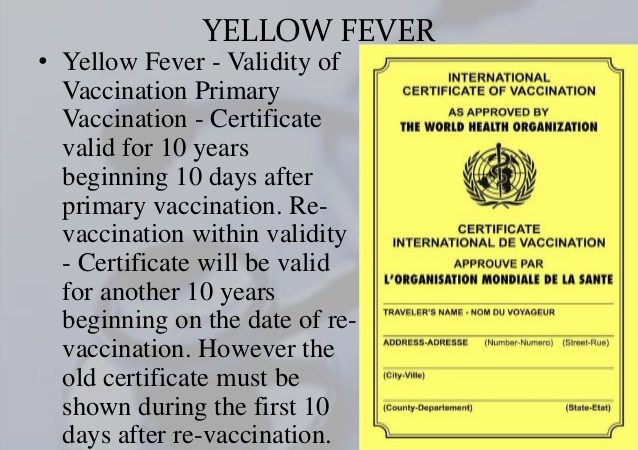Yellow fever vaccination for travelers to Uganda, Rwanda, and DR Congo
Yellow fever vaccination for travelers: Most travellers tend to ask about the yellow fever vaccination when travelling to Uganda, Rwanda and the Democratic Republic of Congo. When you are planning to take on a safari to East Africa, it is advisable to consult your doctor about the potential of contracting yellow fever or getting the yellow fever shot. Yellow fever is a more deadly disease in the tropics unlike malaria that has a cure but for yellow fever only a vaccine is available. It is important that one gets the yellow fever shot ahead of travel to these countries especially the Democratic republic of Congo where it is a must to present a certificate especially if you are planning on visiting the forests or wetlands.

Yellow fever is a mosquito-transmitted disease and these mosquitoes are also known for spreading the Zika virus. There are three forms of yellow fever that is sylvatic yellow fever mainly contracted by people living in the rain forests and wild places, intermediate yellow fever that can be contracted from your home and the urban yellow fever that can be spread from one infected person to another. Once infected with the virus, the virus may stay dormant in the body for about 5 days before the signs and symptoms start to show.
A few of the signs of the yellow fever include loss of appetite , muscle pains, shivering, nausea and fever and vomiting in some cases that are escalated. After some time, an infected person will start to bleed from all openings on the face that is the eyes, the mouth and ears with some abdominal pain. After about 10 to 15 days, if the patient’s kidney fails, there will be death. These symptoms are familiar to those of an Ebola patient a common disease in West Africa. The yellow fever vaccine is approved to prevent the disease at almost 100% and it is effective when taken at least a week before travel.
Ensure if you are taking the shot, it is administered to you at a facility approved by the World Health Organization and the CDC Center for Disease control as these are the only ones with genuine yellow fever vaccination cards and certificates from the World health organization and accepted by all destinations. On top of receiving the vaccine, you are advised to continue to sleep under a mosquito net. The issue of having a certificate of receiving the yellow fever vaccine in Africa is a serious one as there is concern of the urban yellow fever where one can get infected if a mosquito bites an infected person and spreads it to the rest and the temperatures in Africa favor the breeding of the mosquitoes.
This yellow fever vaccination card upon entry of the Democratic republic of Congo, Rwanda, Uganda, Tanzania and Kenya, all travellers will be asked to present a valid vaccination card at all entry points be the land borders or the international airports. The card is usually presented to the immigrations officer along with your passport so ensure to have one to avoid disappointment. Some airports and land borders are well equipped with medical staff to assist you to get vaccine and be certified.
There may be a few exceptions for this vaccine and that is the pregnant women, the very young children at infant level, people who are allergic to egg protein and those individuals who are already battling with immune-deficient diseases like sickle cells, cancer and HIV/AIDS. You can ask your doctor to provide you with a form exempting you from taking the vaccine in case you are suffering from any of the above.
There are a number of African countries that have in the past has outbreaks of yellow vaccine. Angola may be the only destination that is still battling with the fever while others like the Central African Republic, Trinidad and Tobago, Equatorial Guinea, Liberia Congo, Chad, Uganda, Ethiopia, Cote d’Ivoire, Burundi, Burkina Faso, Benin, Mauritania, Mali, South Sudan, Niger and Nigeria are now free and have not had cases in a while.
Just like any vaccination, this virus tends to have some minor side effects that you should expect like headache, fatigue or body pains. On your safari in Africa, it is important to protect yourself from mosquito bites by sleeping under a mosquito net, carry and use your mosquito repellant and also wear long sleeved shirts and long trousers to protect your body parts from mosquito bites.


